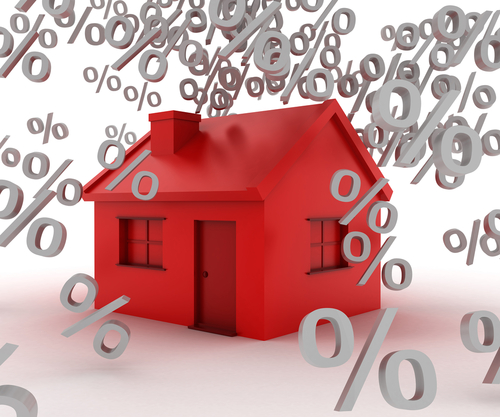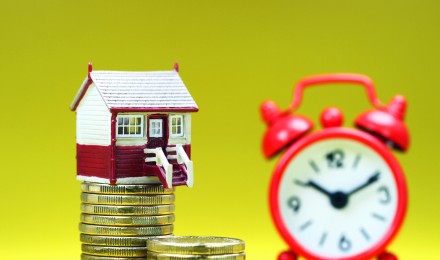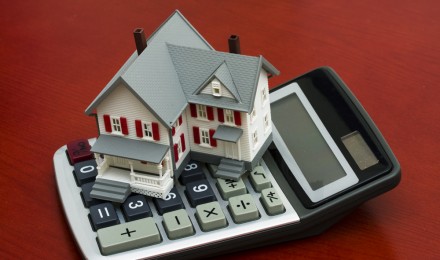A mortgage rate is the amount of interest that your lender charges you when you take a home loan. Interest is essentially the cost of borrowing money. A lender is not going to give you cash for free but is instead going to charge you a percentage of the total amount borrowed in interest. The mortgage rate defines what that percentage is.
How is a Mortgage Rate Determined?
A mortgage rate is determined by both your finances and the home you are buying, as well as by market conditions at the time when you purchase the home. Mortgage rates vary across the country and from lender to lender. It pays to shop around to get a competitive rate. It is easy to check out rates by lenders in your area.
The reason mortgage rates are similar is that they are determined by market factors or prevailing economic conditions. For instance:
- Mortgage money generally comes from investors who are interested in earning a return on their investment (the return they earn is equal to the interest you pay). Mortgages thus have to be attractive to investors as compared with other investments such as Treasury Bonds. The 10-year treasury yield (amount paid by treasury bonds issued by the government) can thus affect mortgage rates.
- The Federal Reserve (the central bank in the U.S.) affects interest rates by controlling the money supply. When more money is available, interest rates go down because there is more money to lend. When less money is available, interest rates go up because the market is tighter.
- Inflation: Inflation is an upward change in the prices of items across the economy, affecting purchasing power (for instance, when milk cost $1.00 last year and $1.10 this year, your purchasing power is affected and your money is essentially worth less). When there is high inflation (your money is quickly becoming worth less), mortgage lenders charge higher interest to make up for the fact that the money they have is less valuable.
- Supply and demand: When the economy is going badly, unemployment is high and consumer confidence is low, fewer people are going to want mortgages. This drives mortgage rates down since the demand is low. When housing prices are increasing rapidly and the economy is great, there is more demand for mortgages and the rates might go up because of more demand.
Because of all of these external factors affecting mortgage rates, many people try to time the market and buy when rates are at their lowest. This can be challenging and is not necessarily the best way to decide when to buy a house unless you are an experienced investor. Instead, you should focus on whether the time is right for you and your family and on whether you can truly afford the house at the current market interest rates.
Other Factors Affecting Mortgage Rates
While market factors play a big role in setting general mortgage rates, some of the things that you do will also affect your particular mortgage rate. For instance:
- Your Credit Affects Your Mortgage Rate
Having good credit. allows you to qualify for the lowest rates while having bad credit can make it difficult to get a loan or can result in a higher mortgage rate because lenders will see you as a riskier investment for which they want a higher return for taking a chance.
- Buying a home that is very expensive can result in a higher interest rate.
Loans above $417,000 are considered “jumbo” or “non-conforming.” Banks usually don’t keep loans in house but instead resell them. The two major purchases of mortgage loans are Fannie Mae and Freddie Mac, but they will only cover or purchase loans up to the $417,000 “conforming” amount (in certain areas of the country, this amount is higher to account for higher housing prices). A jumbo loan comes with a higher mortgage rate since it is more difficult for the bank to sell the loan if it needs to.
- The type of mortgage you choose affects rates as well.
A thirty-year fixed rate mortgage will have the same mortgage rate over the life of the loan. This gives investors a guarantee of their return and lets you know what you will be paying. Because the loan is held for a long time (30 years), the interest rate is a little higher than a 15-year fixed rate mortgage that is paid back in half the time.
The higher rate compensates investors for inflation and ensures they make enough money to make the loan worth their while. An adjustable rate mortgage, on the other hand, typically has the lowest interest rate initially since it is a teaser rate designed to get you to take the mortgage and buy a house. However, this rate can adjust upward over time as it is typically only fixed for a designated number of years before it begins to adjust based on some set formula.
Getting a Mortgage
As you shop for a mortgage, it is important to compare mortgage rates. The higher the rate, the more you will pay in interest, the higher your monthly payments will be and the more you will pay over the life of your loan.
A mortgage rate is the amount of interest that your lender charges you when you take a home loan. Interest is essentially the cost of borrowing money. A lender is not going to give you cash for free but is instead going to charge you a percentage of the total amount borrowed in interest. The mortgage rate defines what that percentage is.
How is a Mortgage Rate Determined?
A mortgage rate is determined by both your finances and the home you are buying, as well as by market conditions at the time when you purchase the home. Mortgage rates vary across the country and from lender to lender. It pays to shop around to get a competitive rate. It is easy to check out rates by lenders in your area.
The reason mortgage rates are similar is that they are determined by market factors or prevailing economic conditions. For instance:
- Mortgage money generally comes from investors who are interested in earning a return on their investment (the return they earn is equal to the interest you pay). Mortgages thus have to be attractive to investors as compared with other investments such as Treasury Bonds. The 10-year treasury yield (amount paid by treasury bonds issued by the government) can thus affect mortgage rates.
- The Federal Reserve (the central bank in the U.S.) affects interest rates by controlling the money supply. When more money is available, interest rates go down because there is more money to lend. When less money is available, interest rates go up because the market is tighter.
- Inflation: Inflation is an upward change in the prices of items across the economy, affecting purchasing power (for instance, when milk cost $1.00 last year and $1.10 this year, your purchasing power is affected and your money is essentially worth less). When there is high inflation (your money is quickly becoming worth less), mortgage lenders charge higher interest to make up for the fact that the money they have is less valuable.
- Supply and demand: When the economy is going badly, unemployment is high and consumer confidence is low, fewer people are going to want mortgages. This drives mortgage rates down since the demand is low. When housing prices are increasing rapidly and the economy is great, there is more demand for mortgages and the rates might go up because of more demand.
Because of all of these external factors affecting mortgage rates, many people try to time the market and buy when rates are at their lowest. This can be challenging and is not necessarily the best way to decide when to buy a house unless you are an experienced investor. Instead, you should focus on whether the time is right for you and your family and on whether you can truly afford the house at the current market interest rates.
Other Factors Affecting Mortgage Rates
While market factors play a big role in setting general mortgage rates, some of the things that you do will also affect your particular mortgage rate. For instance:
- Your Credit Affects Your Mortgage Rate
Having good credit. allows you to qualify for the lowest rates while having bad credit can make it difficult to get a loan or can result in a higher mortgage rate because lenders will see you as a riskier investment for which they want a higher return for taking a chance.
- Buying a home that is very expensive can result in a higher interest rate.
Loans above $417,000 are considered “jumbo” or “non-conforming.” Banks usually don’t keep loans in house but instead resell them. The two major purchases of mortgage loans are Fannie Mae and Freddie Mac, but they will only cover or purchase loans up to the $417,000 “conforming” amount (in certain areas of the country, this amount is higher to account for higher housing prices). A jumbo loan comes with a higher mortgage rate since it is more difficult for the bank to sell the loan if it needs to.
- The type of mortgage you choose affects rates as well.
A thirty-year fixed rate mortgage will have the same mortgage rate over the life of the loan. This gives investors a guarantee of their return and lets you know what you will be paying. Because the loan is held for a long time (30 years), the interest rate is a little higher than a 15-year fixed rate mortgage that is paid back in half the time.
The higher rate compensates investors for inflation and ensures they make enough money to make the loan worth their while. An adjustable rate mortgage, on the other hand, typically has the lowest interest rate initially since it is a teaser rate designed to get you to take the mortgage and buy a house. However, this rate can adjust upward over time as it is typically only fixed for a designated number of years before it begins to adjust based on some set formula.
Getting a Mortgage
As you shop for a mortgage, it is important to compare mortgage rates. The higher the rate, the more you will pay in interest, the higher your monthly payments will be and the more you will pay over the life of your loan.







